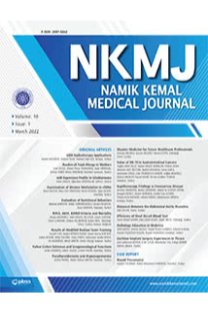FACTORS OF AFFECTING SLEEP QUALITY IN CANCER PATIENTS
Kanser Hastalarında Uyku Kalitesini Etkileyen Faktörler
___
1. Passik S.D, Whitcomb L.A, Kirsh K.L ,Theobald D.E. An unsuccessful attempt to develop a single-item screen for insomnia in cancer patients. Journal of Pain and Symptom Management 2003: 25; 284-7.2. Steindorf K, Clauss D, Tjaden C, Hackert T, Herbolsheimer F, Bruckner T, et al. Quality of Life, Fatigue, and Sleep Problems in Pancreatic Cancer Patients—A Randomized Trial on the Effects of Exercise . Dtsch Arztebl Int. 2019 ;116:471- 8.
3. Mollayeva T, Thurairajah P, Burton K, Mollayeva S, Shapiro CM, Colantonio A. The Pittsburgh sleep quality index as a screening tool for sleep dysfunction in clinical and non-clinical samples: A systematic review and meta-analysis. Sleep MedN Rev. 2016 ;25:52-73.
4. Ağargün MY, Kara H, Anlar O. Pittsburgh Uyku Kalitesi İndeksi’nin Geçerliği ve Güvenirliği. Turk Psikiyatri Derg 1996;7:107- 11.
5. Beck S.L, Schwartz A.L, Towsley G, Dudley W, Barsevick A. Psycho- metric evaluation of the Pittsburgh Sleep Quality Index in cancer patients. Journal of Pain and Symptom Management 2004 ;27:140-8.
6. de Kock I, Mirhosseini M, Lau F, Thai V, Downing M, Quan H, et al. Conversion of Karnofsky Performance Status (KPS) and Eastern Cooperative Oncology Group Performance Status (ECOG) to Palliative Performance Scale (PPS), and the interchangeability of PPS and KPS in prognostic tools. J Palliat Care. 2013 ;29:163-9.
7. Morris JL, Rohay J, Chasens ER. Sex Differences in the Psychometric Properties of the Pittsburgh Sleep Quality Index. J Womens Health (Larchmt). 2018 ;27 :278-82.
8. Wang YP, Gorenstein C. Psychometric properties of the Beck Depression Inventory- II: a comprehensive review. Braz J Psychiatry. 2013 ;35:416-31.
9. Julian LJ. Measures of anxiety: State-Trait Anxiety Inventory (STAI), Beck Anxiety Inventory (BAI), and Hospital Anxiety and Depression Scale-Anxiety (HADS-A). Arthritis Care Res (Hoboken). 2011;63 :467-72.
10. Savard J, Laroche L, Simard S, Ivers H, Morin C.M. Chronic insomnia and immune functioning. Psychosomatic Medicine 2003; 65, 211-21.
11. Carpenter JS, Andrykowski MA. Psychometric evaluation of the Pittsburgh Sleep Quality Index. J Psychosom Res 1998;45: 5-13.
12. Forter BV, Stepanski EJ, Wang SC, Kasprowicz S, Durrence HH. Sleep and quality of life in breast cancer patients. J Pain Symptom Manage 2002;24: 471-80.
13. Savard J, Morin CM. Insomnia in the context of cancer: a review of a neglected problem. J Clin Oncol 2001; 19:895-908.
14. Harrington JJ1, Lee-Chiong T Jr. Sleep and older patients. Clin Chest Med. 2007 ;28 :673-84.
15. Byles JE, Mishra GD, Harris MA. The experience of insomnia among older women. Sleep 2005;28: 972-9.
16. Davidson JR, MacLean AW, Brundage MD, Schulze K. Sleep disturbance in cancer patients. Soc Sci Med 2002;54: 1309- 21.
17. Mercadante S, Girelli D, Casuccio A.Sleep disorders in advanced cancer patients: prevalence and factors associated. Support Care Cancer. 2004 May;12(5):355-9.
18. Theobald DE. Cancer pain, fatigue, distress, and insomnia in cancer patients. Clin Cornerstone 2004;6 ;15-21.
19. Murphy PJ, Badia P, Myers BL, Boecker MR, Wright KP Jr. Nonsteroidal anti-inflammatory drugs affect normal sleep patterns in humans. Physiol Behav. 1994;55:1063-6.
20. Roth T, Drake C. Evolution of insomnia: currents status and future direction. Sleep Med 2004;5: 23-30.
21. Buysse DJ. Insomnia, depression and aging Assessing sleep and mood interactions in older adults. Geriatrics 2004;59: 47- 51.
22. Kuo H.H., Chiu M.J., Liao W.C., Hwang S.L. Quality of sleep and related factors during chemotherapy in patients with stage I/II breast cancer. Journal of the Formosan Medical Association. 2006; 105: 64-9.
- ISSN: 2587-0262
- Yayın Aralığı: 4
- Başlangıç: 2013
- Yayıncı: Galenos Yayınevi
Tiroid Cerrahisinde Aralıklı İntraoperatif Nöromonitorizasyonun Elektromiyografik Özellikleri
Yusuf YAĞMUR, Edip Erdal YILMAZ, Serdar GÜMÜŞ
A SHEEP IN WOLF’S CLOTHING, OR A WOLF IN SHEEP’S CLOTHING? KERATOACHANTOMA
Fatma BİLGEN, Alper URAL, Mehmet BEKERECİOĞLU
Mehmet Şerif CANSEVER, Zeynep KALAYCIOĞLU, Fatma Bedia ERİM, Tanyel ZÜBARİOĞLU, Ertuğrul KIYKIM, Ayşe Çiğdem AKTUĞLU ZEYBEK
ERİTROSİT DAĞILIM GENİŞLİĞİ: MİGREN-İLİŞKİLİ BEYİN MRG LEZYONLARI İÇİN YENİ BİR BELİRTEÇ Mİ?
OTİZM SPEKTRUM BOZUKLUĞUNUN NEDENLERİNE AİT EBEVEYN ALGISININ TEDAVİ TERCİHİNE ETKİSİ
Miraç Barış USTA, Ayşegül DUMAN KURT, Hatice GÜLŞEN, Koray KARABEKİROĞLU
KRANİAL MRG İNCELEMESİ SONRASI POSTURAL STABİLİTENİN BİODEKS DENGE SİSTEMİ İLE DEĞERLENDİRİLMESİ
ELECTROMYOGRAPHIC FEATURES OF INTERMITTENT INTRAOPERATIVE NEUROMONITORIZATION IN THE THYROID SURGERY
Serdar GÜMÜŞ, Edip Erdal YILMAZ, Yusuf YAĞMUR
Nukleus Akumbens Bölgesine Uygulanan Topiramatın Morfin Yoksunluk Sendromuna Etkileri
Mahluga JAFAROVA DEMİRKAPU, Hasan Raci YANANLI, Songül ÖZKULA, Rezzan GÜLHAN, Oya Helin DUNDAR, Selçuk EROL, Ramazan BAKAR, Heja GECİT, N. Eymen TURAN, M. Fırat BALIK
